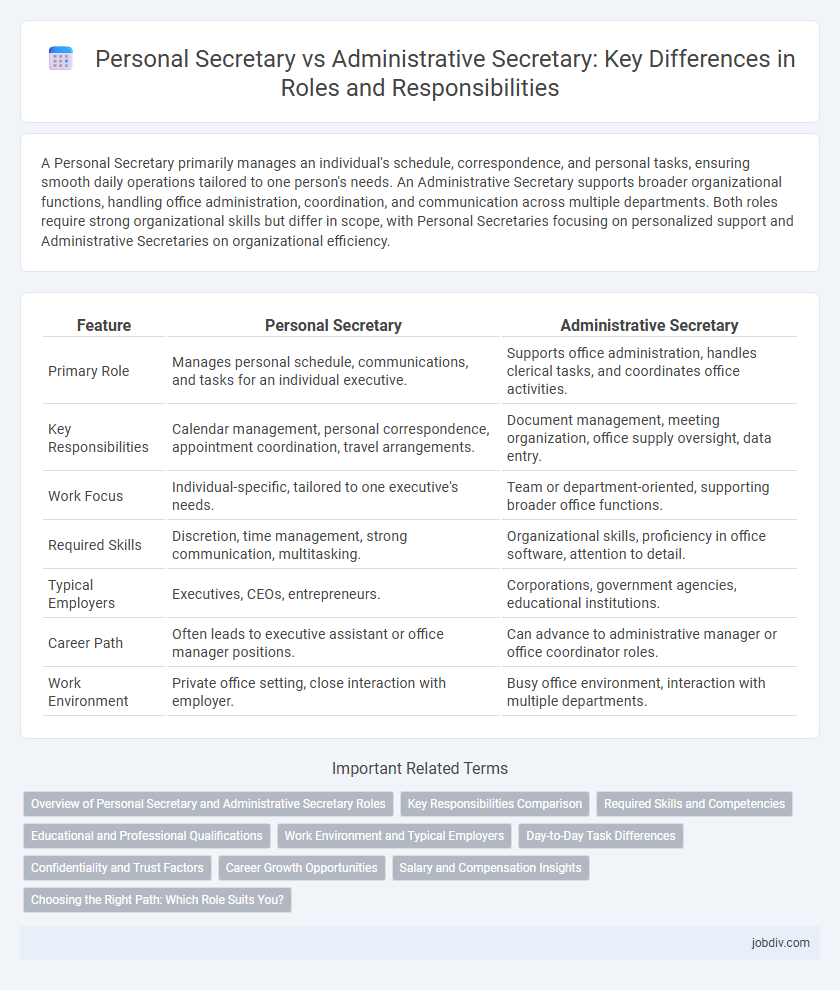A Personal Secretary primarily manages an individual's schedule, correspondence, and personal tasks, ensuring smooth daily operations tailored to one person's needs. An Administrative Secretary supports broader organizational functions, handling office administration, coordination, and communication across multiple departments. Both roles require strong organizational skills but differ in scope, with Personal Secretaries focusing on personalized support and Administrative Secretaries on organizational efficiency.
Table of Comparison
| Feature | Personal Secretary | Administrative Secretary |
|---|---|---|
| Primary Role | Manages personal schedule, communications, and tasks for an individual executive. | Supports office administration, handles clerical tasks, and coordinates office activities. |
| Key Responsibilities | Calendar management, personal correspondence, appointment coordination, travel arrangements. | Document management, meeting organization, office supply oversight, data entry. |
| Work Focus | Individual-specific, tailored to one executive's needs. | Team or department-oriented, supporting broader office functions. |
| Required Skills | Discretion, time management, strong communication, multitasking. | Organizational skills, proficiency in office software, attention to detail. |
| Typical Employers | Executives, CEOs, entrepreneurs. | Corporations, government agencies, educational institutions. |
| Career Path | Often leads to executive assistant or office manager positions. | Can advance to administrative manager or office coordinator roles. |
| Work Environment | Private office setting, close interaction with employer. | Busy office environment, interaction with multiple departments. |
Overview of Personal Secretary and Administrative Secretary Roles
Personal secretaries manage the schedules, communications, and confidential matters of executives, ensuring seamless daily operations and prioritizing personalized support. Administrative secretaries handle office management tasks, including coordinating meetings, preparing documents, and supervising clerical staff to maintain organizational efficiency. Both roles require strong communication and organizational skills but differ in scope, with personal secretaries focusing on individual executive support and administrative secretaries on broader office administration.
Key Responsibilities Comparison
Personal secretaries primarily manage individual executives' schedules, correspondence, and personal tasks, ensuring seamless daily operations. Administrative secretaries handle broader office functions such as coordinating meetings, preparing reports, and managing communication across departments. Both roles require strong organizational skills but differ in scope, with personal secretaries focusing on personalized support and administrative secretaries overseeing general office administration.
Required Skills and Competencies
A Personal Secretary requires exceptional organizational skills, discretion, and the ability to manage confidential information while coordinating schedules and communication for a single executive. An Administrative Secretary demands strong multitasking capabilities, proficiency in office software, and effective communication skills to support an entire team or department. Both roles necessitate time management, attention to detail, and adaptability, but the Personal Secretary emphasizes personalized support, whereas the Administrative Secretary focuses on broader administrative functions.
Educational and Professional Qualifications
Personal secretaries typically require a high school diploma with proficiency in typing, scheduling, and communication, often complemented by specialized training or certification in office administration. Administrative secretaries usually hold an associate degree or higher in business administration or related fields, demonstrating advanced skills in office management, software applications, and organizational procedures. Professional qualifications for both roles emphasize discretion, multitasking, and strong interpersonal abilities, with administrative secretaries often bearing more responsibility in managing complex office operations.
Work Environment and Typical Employers
Personal secretaries primarily work in executive offices, supporting high-level individuals such as CEOs and managers within corporate, legal, or medical environments. Administrative secretaries are commonly employed in a broader range of settings, including government agencies, educational institutions, and large organizations, managing office operations and coordinating administrative tasks. The work environment for personal secretaries tends to be more private and one-on-one, while administrative secretaries often operate in team-oriented and dynamic office settings.
Day-to-Day Task Differences
Personal secretaries manage schedules, appointments, and personal correspondence for executives, ensuring seamless daily organization and confidentiality. Administrative secretaries handle office-wide tasks such as coordinating meetings, managing records, and supporting multiple departments to maintain smooth operational flow. The key difference lies in the personal secretary's focus on individualized support versus the administrative secretary's broader office management responsibilities.
Confidentiality and Trust Factors
A Personal Secretary manages highly confidential information and sensitive communications with a strong emphasis on trust and discretion, often supporting top executives or individuals in private settings. An Administrative Secretary handles a broader range of organizational tasks, where confidentiality is important but typically involves less personal, sensitive data. Trust factors in a Personal Secretary role are paramount due to direct access to private matters, whereas Administrative Secretaries maintain confidentiality primarily within business operations.
Career Growth Opportunities
Personal secretaries often experience rapid career growth by building close relationships with executives, gaining unique insights into company strategy and decision-making. Administrative secretaries typically develop a broader skill set through managing office operations and supporting multiple departments, which can lead to higher-level administrative roles or office management. Both roles offer distinct pathways, with personal secretaries advancing through executive support and administrative secretaries progressing via organizational leadership.
Salary and Compensation Insights
Personal secretaries typically earn between $40,000 and $60,000 annually, reflecting their support role to specific executives or individuals. Administrative secretaries often command higher salaries ranging from $45,000 to $70,000 due to broader organizational responsibilities and supervisory duties. Compensation packages for both roles may include bonuses, health benefits, and retirement plans, varying significantly by industry and geographic location.
Choosing the Right Path: Which Role Suits You?
Choosing between a Personal Secretary and an Administrative Secretary depends on your preference for specialized or broad organizational support. Personal Secretaries typically manage the schedules, communications, and personal tasks of executives, requiring strong interpersonal and confidentiality skills. Administrative Secretaries handle a wide variety of office duties, coordinating between departments and ensuring smooth operations, which suits those who enjoy multitasking and a dynamic work environment.
Personal Secretary vs Administrative Secretary Infographic

 jobdiv.com
jobdiv.com